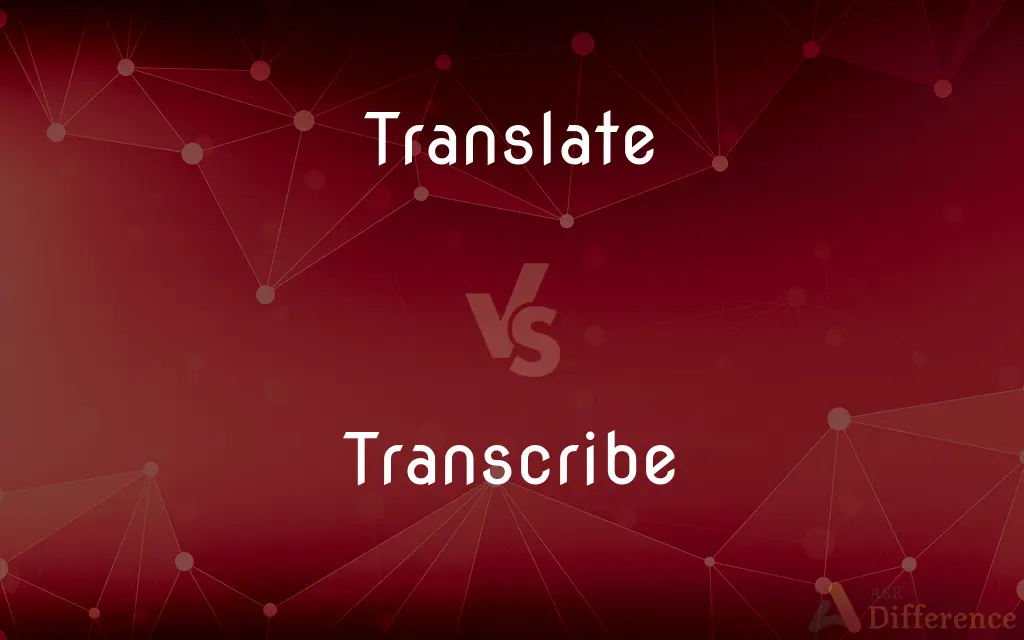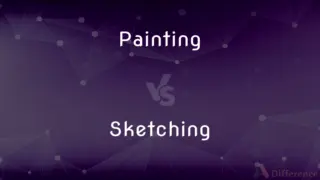Translate vs. Transcribe — What's the Difference?
By Fiza Rafique & Urooj Arif — Updated on April 25, 2024
Translate involves converting text or speech from one language to another, focusing on meaning and context, while transcribe entails converting spoken words into written text, maintaining the original language.

Difference Between Translate and Transcribe
Table of Contents
ADVERTISEMENT
Key Differences
Translate involves rendering text or speech from one language into another, adapting idioms, cultural references, and nuances to maintain meaning. Transcribe, on the other hand, involves writing down spoken words exactly as they are spoken, without changing the language but sometimes including non-verbal sounds.
Translate requires a deep understanding of both the source and target languages and cultures to effectively communicate the original message. Transcribe primarily requires accurate listening skills and a good command of the language being spoken to capture every word and sound correctly.
Translate often involves choices about style and tone to best suit the target audience and context. Transcribe focuses on accuracy and detail, aiming to produce a text that mirrors the original speech as closely as possible.
Translate can be done for written texts or during spoken communication, such as in simultaneous interpreting. Transcribe is typically done from audio recordings, live events, or directly from speech.
Translate might require localization to adapt content to the cultural context of the target audience. Transcribe may require the transcriber to interpret and spell out dialects or accents accurately without changing the intended meaning.
ADVERTISEMENT
Comparison Chart
Purpose
To convey meaning across languages.
To convert speech into written form.
Focus
Meaning and cultural nuance.
Accurate replication of spoken words.
Skills Required
Linguistic, cultural understanding.
Listening, fast typing, attention to detail.
Typical Applications
Books, media, conferences.
Court proceedings, medical transcription.
Output
Text in a different language.
Text in the same language.
Compare with Definitions
Translate
To render words or text from one language to another.
She translates novels from Spanish to English.
Transcribe
To note down music or other audio.
He transcribes jazz solos by ear.
Translate
To express the sense of words or text in another language.
He translates complex legal documents into plain language.
Transcribe
To convert audio into a text document.
The journalist transcribed the interview for her article.
Translate
To decode or interpret information.
The spy translated the encrypted message.
Transcribe
To write down or record spoken words.
She transcribes medical lectures for students.
Translate
To adapt cultural content for different audiences.
The movie was translated for international audiences with cultural nuances in mind.
Transcribe
To make a written copy of dictated or recorded speech.
He transcribes courtroom proceedings.
Translate
To perform linguistic conversion.
The software translates spoken language into text.
Transcribe
To document verbal communication accurately.
She transcribes live speeches at conferences.
Translate
To render in another language
Translated the Korean novel into German.
Transcribe
To make a full written or typewritten copy of (dictated material, for example).
Translate
To express in different, often simpler words
Translated the technical jargon into ordinary language.
Transcribe
(Computers) To transfer (information) from one recording and storing system to another.
Translate
To change from one form, function, or state to another; convert or transform
Translate ideas into reality.
Transcribe
To adapt or arrange (a composition) for a voice or instrument other than the original.
Translate
To express in another medium
Translated the short story into a movie.
Transcribe
To translate (a composition) from one notational system to another.
Translate
To transfer from one place or condition to another
"His remains were translated to San Juan de Puerto Rico where they still rest" (Samuel Eliot Morison).
Transcribe
To reduce (live or recorded music) to notation.
Translate
To forward or retransmit (a telegraphic message).
Transcribe
To record, usually on tape, for broadcast at a later date.
Translate
(Ecclesiastical) To transfer (a bishop) to another see.
Transcribe
(Linguistics) To represent (speech sounds) by phonetic symbols.
Translate
To convey to heaven without death.
Transcribe
To translate or transliterate.
Translate
(Physics) To subject (a body) to translation.
Transcribe
(Biology) To cause (DNA) to undergo transcription.
Translate
(Biology) To subject (messenger RNA) to translation.
Transcribe
To convert a representation of language, typically speech but also sign language, etc., to a written representation of it. The term now usually implies the conversion of speech to text by a human transcriptionist with the assistance of a computer for word processing and sometimes also for speech recognition, the process of a computer interpreting speech and converting it to text.
Translate
To make a translation.
Transcribe
(dictation) To make such a conversion from live or recorded speech to text.
The doctor made several recordings today which she will transcribe into medical reports tomorrow.
Translate
To work as a translator.
Transcribe
(computing) To transfer data from one recording medium to another.
Translate
To admit of translation
His poetry translates well.
Transcribe
(music) To adapt a composition for a voice or instrument other than the original; to notate live or recorded music.
Translate
To be changed or transformed in effect. Often used with into or to
"Today's low inflation and steady growth in household income translate into more purchasing power" (Thomas G. Exter).
Transcribe
(biochemistry) To cause DNA to undergo transcription.
Translate
Senses relating to the change of information, etc., from one form to another.
Transcribe
(linguistics) To represent speech by phonetic symbols.
Translate
(transitive) To change spoken words or written text (of a book, document, movie, etc.) from one language to another.
Hans translated my novel into Welsh.
Transcribe
To write over again, or in the same words; to copy; as, to transcribe Livy or Tacitus; to transcribe a letter.
Translate
(intransitive) To provide a translation of spoken words or written text in another language; to be, or be capable of being, rendered in another language.
Hans translated for us while we were in Marrakesh.
That idiom doesn’t really translate.
‘Dog’ translates as ‘chien’ in French.
Transcribe
Write out from speech, notes, etc.;
Transcribe the oral history of this tribe
Translate
(transitive) To express spoken words or written text in a different (often clearer or simpler) way in the same language; to paraphrase, to rephrase, to restate.
Transcribe
Rewrite in a different script;
The Sanskrit text had to be transliterated
Translate
(transitive) To change (something) from one form or medium to another.
The director faithfully translated their experiences to film.
Transcribe
Rewrite or arrange a piece of music for an instrument or medium other than that originally intended
Translate
(intransitive) To change, or be capable of being changed, from one form or medium to another.
Excellent writing does not necessarily translate well into film.
His sales experience translated well into his new job as a fund-raiser.
Transcribe
Make a phonetic transcription of;
The anthropologist transcribed the sentences of the native informant
Translate
To generate a chain of amino acids based on the sequence of codons in an mRNA molecule.
Transcribe
Convert the genetic information in (a strand of DNA) into a strand of RNA, especially messenger RNA
Translate
Senses relating to a change of position.
Translate
To move (something) from one place or position to another; to transfer.
Translate
To t=place in a trance, to cause to lose recollection or sense.
William was translated by the blow to the head he received, being unable to speak for the next few minutes.
Translate
(analysis) In Euclidean spaces: a set of points obtained by adding a given fixed vector to each point of a given set.
Translate
To bear, carry, or remove, from one place to another; to transfer; as, to translate a tree.
In the chapel of St. Catharine of Sienna, they show her head- the rest of her body being translated to Rome.
Translate
To change to another condition, position, place, or office; to transfer; hence, to remove as by death.
Translate
To remove to heaven without a natural death.
By faith Enoch was translated, that he should not see death; and was not found, because God had translatedhim.
Translate
To remove, as a bishop, from one see to another.
Translate
To render into another language; to express the sense of in the words of another language; to interpret; hence, to explain or recapitulate in other words.
Translating into his own clear, pure, and flowing language, what he found in books well known to the world, but too bulky or too dry for boys and girls.
Translate
To change into another form; to transform.
Happy is your grace,That can translatethe stubbornness of fortuneInto so quiet and so sweet a style.
Translate
To cause to remove from one part of the body to another; as, to translate a disease.
Translate
To cause to lose senses or recollection; to entrance.
Translate
To make a translation; to be engaged in translation.
Translate
Restate (words) from one language into another language;
I have to translate when my in-laws from Austria visit the U.S.
Can you interpret the speech of the visiting dignitaries?
She rendered the French poem into English
He translates for the U.N.
Translate
Change from one form or medium into another;
Braque translated collage into oil
Translate
Make sense of a language;
She understands French
Can you read Greek?
Translate
Bring to a certain spiritual state
Translate
Change the position of (figures or bodies) in space without rotation
Translate
Be equivalent in effect;
The growth in income translates into greater purchasing power
Translate
Be translatable, or be translatable in a certain way;
Poetry often does not translate
Tolstoy's novels translate well into English
Translate
Physics: subject to movement in which every part of the body moves parallel to and the same distance as every other point on the body
Translate
Express, as in simple and less technical langauge;
Can you translate the instructions in this manual for a layman?
Is there a need to translate the psychiatrist's remarks?
Translate
Genetics: determine the amino-acid sequence of a protein during its synthesis by using information on the messenger RNA
Common Curiosities
How does technology impact translation?
Technology, especially machine translation tools like Google Translate, helps automate and speed up the translation process, although human oversight is often still necessary for accuracy.
What types of materials are commonly translated?
Books, websites, legal documents, educational materials, and media are commonly translated to reach broader audiences.
What are common settings where transcription is used?
Transcription is frequently used in legal proceedings, medical consultations, academic research, and media production.
Do transcribers need specific qualifications?
Formal qualifications aren't always required, but certifications in specific types of transcription, like medical or legal, can improve job opportunities and reliability.
What is the average speed for transcription?
A professional transcriber can typically transcribe at a rate of 15 to 20 minutes of audio per hour of work, depending on audio quality and the speaker's clarity.
What role does technology play in transcription?
Technologies such as speech recognition software facilitate the transcription process by automatically converting speech into text, though human transcribers are needed for refining and accuracy.
How long does it typically take to translate a book?
The time to translate a book can vary widely depending on the book's length, complexity, and the translator’s expertise, typically ranging from several months to a year.
How do translators handle idioms and cultural references?
Translators often use localization to adapt idioms and cultural references to be understandable and relevant to the target culture, sometimes replacing them with equivalent expressions.
Are there certifications required to become a translator?
While not always mandatory, certifications from organizations like the American Translators Association can enhance a translator’s credibility and job prospects.
What is the biggest challenge in translation?
One of the biggest challenges is maintaining the original tone, style, and nuance of the source material while making it accessible and culturally relevant to the target audience.
What languages are most commonly translated?
English, Spanish, Chinese, Arabic, and French are among the most frequently translated languages due to their large numbers of speakers and global influence.
Can transcription be done for live events?
Yes, real-time transcription services, such as CART (Communication Access Real-time Translation), are available for live events, providing instant text versions of spoken words.
What are some tips for improving transcription accuracy?
Tips include using high-quality recording equipment, becoming familiar with the subject matter, using software tools effectively, and regularly reviewing and correcting the transcript.
What are the ethical considerations for transcribers?
Transcribers must maintain confidentiality, particularly in legal and medical settings, and ensure accurate representation of all recorded speech without alteration.
How do cultural differences impact translation?
Cultural differences can significantly affect translation by altering how concepts, norms, and values are expressed; translators must be culturally aware to avoid misinterpretations.
Share Your Discovery

Previous Comparison
Painting vs. Sketching
Next Comparison
Hydroxyl vs. AlcoholAuthor Spotlight
Written by
Fiza RafiqueFiza Rafique is a skilled content writer at AskDifference.com, where she meticulously refines and enhances written pieces. Drawing from her vast editorial expertise, Fiza ensures clarity, accuracy, and precision in every article. Passionate about language, she continually seeks to elevate the quality of content for readers worldwide.
Co-written by
Urooj ArifUrooj is a skilled content writer at Ask Difference, known for her exceptional ability to simplify complex topics into engaging and informative content. With a passion for research and a flair for clear, concise writing, she consistently delivers articles that resonate with our diverse audience.














































